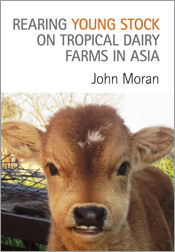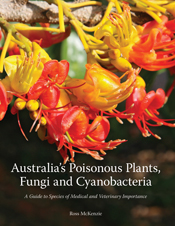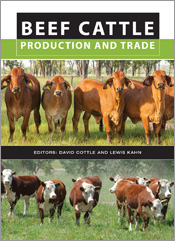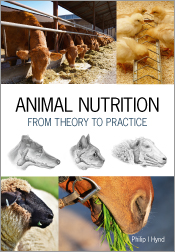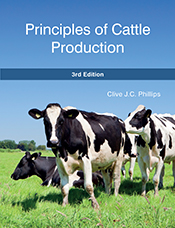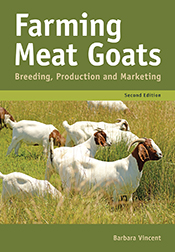Rearing Young Stock on Tropical Dairy Farms in Asia

By: John Moran
Shows small holder dairy farmers in Asia how to attain optimal growth in young stock.
Rearing young stock for replacement heifers is probably one of the least well understood and practised aspects of herd and feeding management on dairy farms throughout the world, particularly on small holder dairy farms in the tropics. This book addresses all the major concerns of the small holder dairy farmer in Asia. It shows how to attain optimal growth in young stock, so that as cows, they can calve at an appropriate early age at the lowest cost and promptly substitute for any cows culled from the milking herd. This provides continuing returns on the investments of feed, labour and other farm resources. + Full description
Low reproductive rates and high calf mortality are the major causes of reproductive wastage. This has a direct bearing on culling and replacement strategies and on genetic improvement. In many tropical countries, calf mortality can be as high as 50%. In some areas this can be due to climatic stress on temperate or crossbred stock. While climatic stress compounds the other hazards of calf life, high calf mortality is usually due to diseases and poor feeding management.
Rearing Young Stock on Tropical Dairy Farms in Asia encourages the small holder dairy farmer to maintain their investment in replacement heifers and gives them the tools necessary to achieve realistic targets for mortalities, live weight gain, mating age, and age and live weight at first calving. It is a companion volume to three previous manuals written by John Moran: Tropical Dairy Farming, Business Management for Tropical Dairy Farmers and Managing High Grade Dairy Cows in the Tropics.
- Short descriptionDetails
Paperback | November 2012 | $ 59.95ISBN: 9780643107427 | 296 pages | 245 x 170 mm
Publisher: CSIRO Publishing
Line Art, Photographs
ePDF | November 2012
ISBN: 9780643107915
Publisher: CSIRO Publishing
Available from eRetailers
ePUB | November 2012
ISBN: 9780643107922
Publisher: CSIRO Publishing
Available from eRetailers
Features
- Shows how to reduce mortality rates of milk fed and weaned heifer replacements in the tropics.
- Covers disease prevention and treatment to ensure a longer lifespan of the milking herd.
- Demonstrates how to achieve optimal growth in heifers so that as cows they can be more productive in both daily milk yields and the number of calves produced during their lifetime.
- Shows the importance of considering replacement heifers as an investment in the farm’s future rather than a farm cost.
CSIRO Publishing would like to thank the Crawford Fund whose generous financial support made the publication of this work possible.
Contents
ForewordAbout the author
Other books and technical manuals by the author
Acknowledgements
Acknowledgement of The Crawford Fund
Chemical warning
1 Introduction
2 The two phases of young stock management
3 Digestion of feeds in the milk-fed calf
4 The nutrient requirements of calves
5 The importance of colostrum to newborn calves
6 Calf and heifer mortalities in the tropics
7 Facilities for calf and heifer rearing in the tropics
8 Milk feeding of calves
9 Calf milk replacers
10 Solid feeds for milk-fed calves
11 Disease prevention in calves
12 Communicating with the calf
13 Post-weaning management of dairy heifers
14 Mating and calving management of dairy heifers
15 The business of calf and heifer rearing
16 Assessing current calf- and heifer-rearing practices
17 Conducting training programs on improved young stock management
18 Best management practices for rearing young stock
Appendix 1: John Moran’s golden rules of calf and heifer rearing
Appendix 2: Conversion of units of measurements
Appendix 3: Currency converter for South and East Asia
Appendix 4: Workshop expectation and evaluation forms
Glossary
References
Index
View the full table of contents (PDF).
Authors
John Moran is a retired Australian senior research and advisory scientist from Victoria’s Department of Primary Industries, located at Kyabram in northern Victoria. While working for DPI, he spent half his time advising farmers in southern Australia and half his time working with dairy farmers and advisers in South and East Asia. His specialist fields include dairy production, ruminant nutrition, calf and heifer rearing, forage conservation and whole farm business management. He currently manages his own consultancy firm called Profitable Dairy Systems.John graduated in 1967 with a Rural Science honours degree from New England University at Armidale in NSW, followed by a Masters degree in 1969. In 1976, he obtained a Doctorate of Philosophy in beef production from University of London, Wye College in England.

